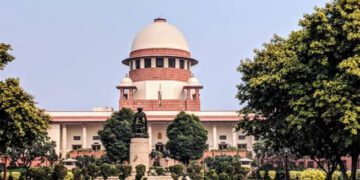THE Supreme Court has held that regardless of the stringency of penal statutes, indefinite refusal of bail is unacceptable, even as it underscored the importance of Article 21 of the Constitution that safeguards the right to life and liberty and enshrines the right to a speedy trial.
“In the case of interpretation of a penal statute, howsoever stringent it may be, a constitutional court has to lean in favour of constitutionalism and the rule of law of which liberty is an intrinsic part. In a particular case, a constitutional court may decline to grant bail. But it would be very wrong to say that under a particular statute, bail cannot be granted. It would run counter to the very grain of our constitutional jurisprudence,” said a Bench comprising Justices JB Pardiwala and Ujjal Bhuyan.
Highlighting that the right to life and personal liberty enshrined under Article 21 of the Constitution is “overarching and sacrosanct”, the Bench noted that a constitutional court cannot be restrained from granting bail to an accused on account of restrictive statutory provisions in a penal statute if it finds that the right of the accused under Article 21 has been infringed. The court’s ruling came as it granted bail to Sheikh Javed Iqbal, who had been languishing in jail for nine years on charges of possessing counterfeit currency after getting booked under the provisions of the Indian Penal Code and Unlawful Activities (Prevention) Act.






























